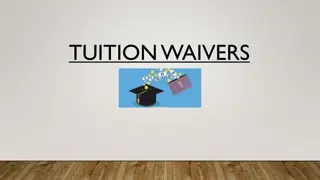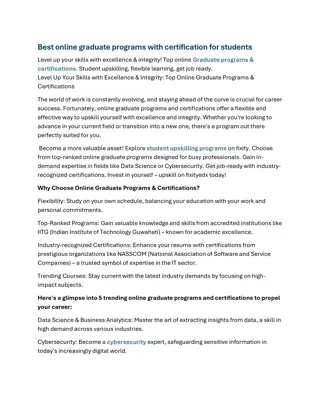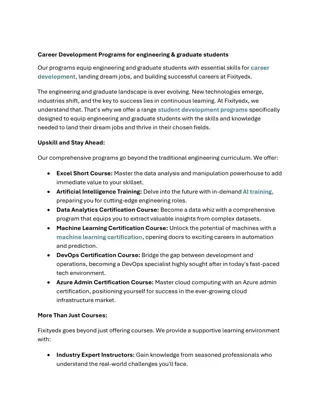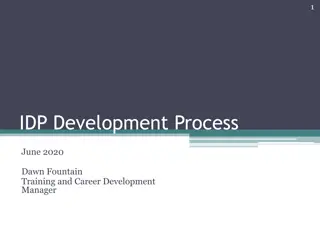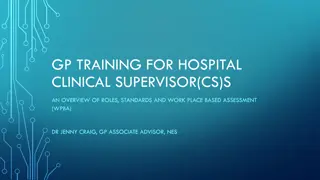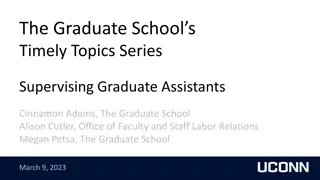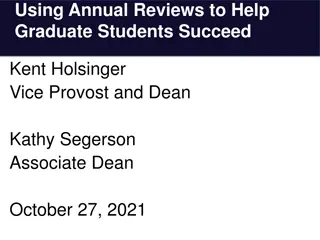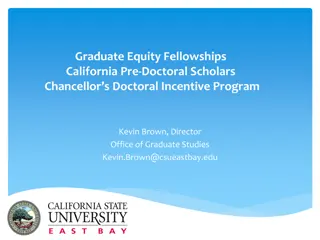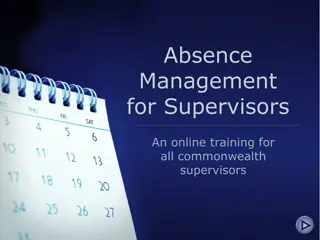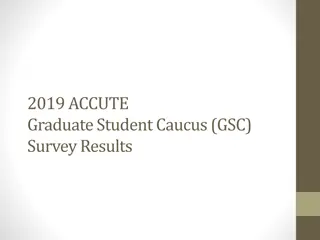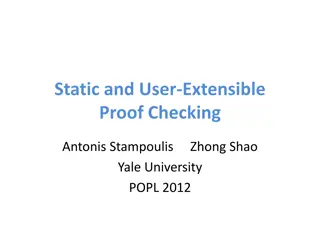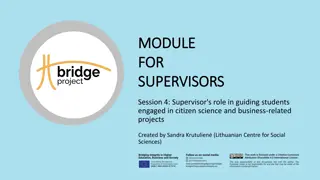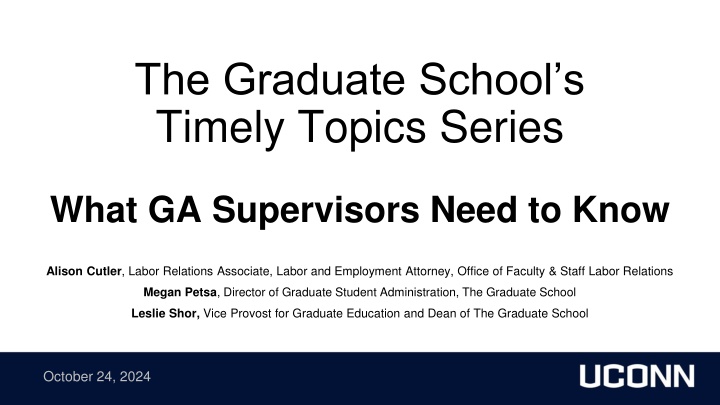
Graduate Assistantships and Academic Progress in PhD Programs
Understand the distinction between graduate assistantships, academic effort, and timely progress towards a PhD degree. Learn about the responsibilities and commitments involved in research and teaching assistantships, and how they relate to academic requirements in a doctoral program.
Download Presentation

Please find below an Image/Link to download the presentation.
The content on the website is provided AS IS for your information and personal use only. It may not be sold, licensed, or shared on other websites without obtaining consent from the author. If you encounter any issues during the download, it is possible that the publisher has removed the file from their server.
You are allowed to download the files provided on this website for personal or commercial use, subject to the condition that they are used lawfully. All files are the property of their respective owners.
The content on the website is provided AS IS for your information and personal use only. It may not be sold, licensed, or shared on other websites without obtaining consent from the author.
E N D
Presentation Transcript
The Graduate Schools Timely Topics Series What GA Supervisors Need to Know Alison Cutler, Labor Relations Associate, Labor and Employment Attorney, Office of Faculty & Staff Labor Relations Megan Petsa, Director of Graduate Student Administration, The Graduate School Leslie Shor, Vice Provost for Graduate Education and Dean of The Graduate School October 24, 2024
Academic Effort Versus GA Duties; Fellowships Primary role is as a graduate student. Article 3 of the CBA provides that management rights and academic issues are not grievable, unless they violate an express term of the contract. It is important the expectations for GA work is distinct from academic effort, including fellowships. GA TAs, RAs, grads whose relationship is substantially identical to GAs: Provide service to the University during academic year and summer/intercession; wages, hours, and working conditions are governed by the CBA, applicable employee policies, and state/federal laws; current CBA expires June 30, 2026; use approved offer letter templates. Exclusions under the CBA: GAs with appointments at the University of Connecticut Health Center (Schools of Medicine and Dental Medicine), graduate students performing internships required as an integral component of a graduate educational program (specifically, in the program known during the 2014-2015 academic year as the Provost s Professional Internship Program for Public Outreach, Service and Engagement), confidential employees and managerial employees shall be excluded from the bargaining unit. If department receives a request to meet with the Union or ask for information, notify LR. Fellowships: Service free; use approved template for award letter. Academic Effort: Annual academic review (template). Student Labor: Administrative work, landscaping, dining hall.
FAQ: What is the relationship between my paid research assistantship and academic work required by my PhD program? Answer: Graduate Assistantships (GAs) provide a union-negotiated stipend, heavily subsidized health insurance, and a tuition waiver. The paid GA work may involve research (a research assistantship, or RA) or teaching (a teaching assistantship, or TA). To ensure that graduate students make timely progress towards their degree, GA positions are always part-time. Thus, a full GA position requires an average of 20 hrs/week and a half GA position requires an average of 10 hrs/week. The research tasks for which an RA is responsible may or may not be closely aligned with a student s thesis or dissertation topic. In cases where the RA duties are closely aligned with the student s thesis or dissertation topic, the paid RA work may also help the student in meeting degree requirements (e.g., completing research work and publications). However, the hourly commitment associated with a research assistantship is NOT sufficient to complete the academic requirements for a PhD. Degrees are earned after all academic requirements are met. The PhD degree requires a combination of coursework and original scholarly research. The type, quality, and quantity of original research required (e.g., number of first-authored publications) is determined by the student s major advisor and advisory committee, in consultation with the student, and in accordance with the common practice of the department and scholarly expectations of the field or research area. To meet the standards for a PhD requires a sustained commitment over many years that will generally far exceed the paid fraction of a student s total effort.
How many hours will you work per week? Paid GA work PhD (20 hrs) Requirements
Case 1: None/Small overlap between RA & PhD requirements Paid RA work PhD (20 hrs) Requirements
FAQ: How are fellowships different from assistantships? Answer: Legally, "scholarships" and "fellowships" are disinterested grants with no substantial quid pro quo from the recipients. In other words, No Services are Provided in return for payment. The IRS requires the University to determine whether monetary awards are compensatory (taxable) or non-compensatory (not taxable). Examples of compensatory services include, but are not limited to, payments for teaching, research, or other services in the nature of part-time employment where the service is required as a condition to receiving the payment. If a monetary award is compensatory, then these payments are wages and should be processed by University Payroll. Issuing a bona fide fellowship requires DHs, Deans, etc. to certify No Services are Provided and agree to this: By checking this box I acknowledge that this fellowship has been reviewed by all appropriate researchers and the cognizant Dean or Department Head and they have determined that this fellowship is non-compensatory in nature. Supporting documentation will be retained in the department office and available for audit inspection. I understand that incorrectly classifying a fellowship as non-compensatory can result in fines and penalties to the University. Fellowships cannot require work. Fellowships can recognize prior achievement. Fellowships can be conditioned on academic status or making satisfactory progress .
Case 3: Fellowship while completing PhD requirements $ PhD Requirements
An Ideal PhD Timeline Level I Level II Level III Develop Plan of Study General exam Final Approval Coursework Y1 Y2 Y3 Y4 Y5 Form Committee Dissertation Proposal Annual Academic Review Committee Meeting Annual Academic Review Committee Meeting Annual Academic Review Final Defense Annual Academic Review Annual Academic Review
Non-Discrimination, Bullying and Harassment Article 4 Process to address GA claims of discrimination, harassment and/or retaliation. Bullying behavior against a GA in the course of their employment, including power-based bullying, is not tolerated. Bullying is defined and examples of behaviors that are not tolerated are provided. Only applicable for GA work, therefore, important to keep academic effort separate and apart from GA work.
Appointment & Reappointment Notification Article 5 Once an offer for appointment is made and accepted in a timely manner, the terms of such appointment shall be honored. Departments should have processes in place to avoid clerical errors in appointment letters before they are sent to the prospective GA. Written offer letters for a less than 1 semester appointment require Union approval so must contact LR and/or TGS before offer is made. There is no obligation to reappoint a GA. However, a decision to not reappoint cannot violate the CBA (e.g. discriminatory purpose) and can impact the grad. Very important to document any concerns with GA. During academic year, GAs are paid to date, therefore, issues that impact their stipend need to be addresses ASAP.
Appointment & Reappointment Notification; SDDs The University shall notify incoming grads of Fall appointments by April 1 and continuing grads by June 1, except in exceptional situations. Spring semester appointments shall be made at least 60 days prior to the beginning of the work assignment. Summer and Intersession notice shall be made by at least 14 days prior to beginning of the work assignment. Offer Letters must contain certain information as per the CBA, use templates. SDDs must be provided to GA 30 days before start of appointment or no later than beginning of the semester; and give GA 24 hours to review. Use the template, must be signed and department must retain.
Workload Article 10 GA workload shall not exceed an average of 20 hours per week. International students are prohibited from working more than 20 hours per week. The specific hours in a week will not unreasonably exceed 20 hours per week, or the pro rata equivalent, in any given week. This means it is not appropriate to front load or back load appointments. Supervisors should make every reasonable effort to accommodate academic commitments. Any work related to a GA appointment (including orientations and trainings) should not be performed prior to the start or after the conclusion of the appointment period. Remote work has to be approved by TGS before work is assigned, as there are implications that must be considered including export control and employment and tax laws.
Academic Leave / GA Leave Who should a student/GA contact if a leave of absence is needed? Leave of Absence from their studies: If a GA is taking a leave of absence from their studies, they must request an Academic Leave through TGS. A leave from their studies will terminate their assistantship, including all GA benefits including but not limited to stipend, benefits and tuition remission benefit. This is because you must be a graduate student in order to hold a GA appointment. Leave of Absence from their assistantship (work only): If a GA is taking a leave of absence from their assistantship, they must request a Graduate Assistant Leave through Human Resources.
Academic Leave of Absence Implications: Temporary separation from the University; holds student's place in program No access to University resources Student cannot hold a GA (GA health insurance, if enrolled, will be terminated at the end of the month in which they are separated) and all other GA benefits are no longer available to them. Courses are removed from the transcript International students must depart the U.S. within 15 days Funding is not guaranteed upon return to graduate study How to request academic leave: Student must initiate a Voluntary Separation Notification form through The Graduate School The VSN form is a two-step process and is considered official notification to the University of cancellation/withdrawal. Notification to the department is not sufficient.
Leaves of Absence Article 15 GA is entitled to 3 days of paid leave per semester for reasons related to those listed in the provision. Department keeps track of leave. It is recommended the GA notify supervisor with as much advance notice as possible in writing. GAs are entitled to FMLA under state law when eligible. Runs concurrent with leave under the CBA. The University may approve additional paid or unpaid leave (not beyond the end of the semester). GA must work through HR. Department should contact LR and/or HR if a GA is not reporting to work as soon as possible. 21 consecutive calendar days or fewer, the GA will retain health insurance and tuition remission benefits. Exceed 21 days, the Dean of TGS will determine if the leave is approved and if benefits will continue, including the stipend, health insurance and tuition remission. GA must work with HR if seeking maternity leave or parental leave.
GA Time Off Article 33 GEU-UAW Article 33 Time off is not the same as Leave. (Article 15 Leaves of Absence.) Time off is analogous to accrued time for other units (i.e., vacation.) GAs with academic year appointments shall have a right to 4 weeks (20 business days) of time off from expected duties and less than an academic year appointments shall have time off on a prorated basis. There will be no reduction in pay or benefits for time off, not expected to "make up" for the time off, no pay out or roll over, no requirement to provide work after submission of grades.The GA s department/supervisor monitors this time off allotment. Time off shall normally be taken during academic break periods when classes are not in session but may be taken at other times when mutually agreed to by the GA and a supervisor. GAs who are required to work during academic break periods or wish to take time off when classes are in session must request time off with as much advance notice as possible. Best practice that the requests and approvals be made in writing. Last Day of Work for F- and J-visa GAs: Are required to stop working as of the day before their degree conferral date. The time between their conferral date and the original contract end date is considered time off.
Holidays Article 16 GAs are not required to work one of their specified holidays: New Year s Day, Martin Luther King, Jr. Day, Memorial Day, Juneteenth, Independence Day, Labor Day, Thanksgiving Day, Christmas Day. If a TA is scheduled to teach on a holiday, then a supervisor (that is not a GA) should allow them to take another day off if they are needed to teach on the holiday.
Summer and Intersession GA Employment Provides for prorated leave days at least 5 week appointment, 1 day; at least 12 week appointment, 2 days. Subject to supervisory approval. GAs are not entitled to time off during summer/intersession appointments except for research appointments as authorized by supervisor.
Discipline and Dismissal Job performance and conduct should be addressed as soon as possible and in most instances utilizing progressive discipline. If a supervisor suspects that a GA may have personal issues (including mental health) that are impacting their work, they must remind the GA of resources and benefits available to the GA as both an employee and as a student as soon as possible, especially HR and EAP. Do not ignore issues and just not reappoint a GA. A GA supervisor should consult with the department head and/or DGS first. LR can assist with all issues but must be consulted before any discipline is issued. Do not meet with the Union or respond to their communications without first consulting LR.
Remote Work Exceptions GAs are expected to arrive prior to their start date and remain for the duration of their appointment. Time off should be used when traveling Requests for exceptions to work remotely from outside CT go through graduatedean@uconn.edu Remote work within CT: May be possible, provided they have supervisor approval and that the responsibilities of the position can be completed from the remote location Request and approval process should be documented in writing and should reflect an understanding from the GA that an approval can be revoked at any time due to business needs Remote work outside CT: Out-of-state (but within U.S.): very limited instances Outside of the U.S.: extraordinary circumstances only Subject to Export Control review For international grads, absence over 2 weeks during the semester can impact SEVIS record GAs with citizenship from a sanctioned country (e.g., Iran, Cuba) cannot work or engage academically in any way from outside the U.S.
Scenarios Bob is a PhD student who has been working as an RA on a research grant since he arrived at UConn nearly 2 years ago. Bob has performed very well in courses (GPA = 3.8), and passed the qualifying exam, but is not performing well in the lab. Bob s advisor, Dr. Kuhl, thinks Bob is not PhD Material and no longer wants to advise or support Bob. What should Dr. Kuhl do next?
Scenarios A GA reaches out to their faculty member to share that they are having a difficult time. They need some space from their duties and academics for a week or so. What should the faculty member do?
Scenarios It s mid-November. A student enrolled in two classes has a sudden health crisis and will not be able to complete their remaining assignments. How should you direct the student?
Scenarios A grad is struggling academically and not performing well as a GA. What does the supervisor PI/academic advisor tell the grad? Is it appropriate for the PI advisor to tell the grad that they are going to rescind the GAship so they can focus on their academics? Or tell the grad they have to voluntarily give up the GA to avoid being put forward for dismissal?

